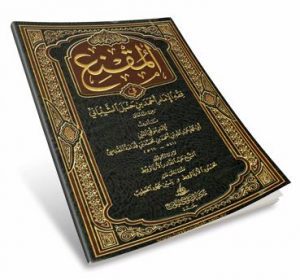AL-MUQNI Fi Fiqh Al-Imam Ahmad Bin Hanbal Ash-Shebani
Author: Muwaffaq al-Din Abu Muhammad Abdullah bin Ahmed bin Mohammed bin Qudamah al-Maqdisi
Muhaqqiq: Mahmoud Arnaout – Yassin Mahmoud Khatib

Indeed, jurisprudence is an indispensable part of Islamic intellectual treasures. There are thousands of fiqh books written by Ahlul Sunnah wa al Jamaa’ scholars from various schools such as Maliki, Hanbali, Ash-Shafi’i and Hanafi. Hence the reference for jurisprudence for each madhhab is fairly numerous. Of course, this wealth of knowledge is worthy and is preserved, especially for the next generation of Islam.
The book entitled Al Muqni ‘fi Fiqh Al Imam Ahmad Ibn Hanbal is one of the leading monumental masterpieces of Ibn Qudamah Al Maqdisi in the jurisprudence discipline of Hanbali madhhab. It is also considered one of the important textbooks of Hanbali fiqh.
This book is very concise and is the reference of the scholars of Hanbali Madhhab since the date of its authorisation till today. Al Muqni ‘became the attention of study for scholars and students of science.
The discussion in the book of Al Muqni is like other jurisprudence books arranged in the order of the usual jurisprudence discussion, beginning from Thaharah (purification) to Iqrar (recognition). The presentation is quite concise to make the book easy to understand.
Download Book | Size: 8.3 MB | Downloaded 962 times
About the Author – Imam Ibn Qudâmah al-Maqdisi:
He was a distinguished scholar of fiqh, known for his mastery of fiqh knowledge and principles and for his wisdom in promoting the correct practice of Islam.
Ibn Katheer said of him:
There was not found in his era nor before it by a long span of time, anyone possessing more fiqh—understanding of the religion—than him.
Ibn Taymeeyah and others also said the same. Born in 541 H (1147 CE) in Nablus, Palestine, Ibn Qudâmah began his Islamic studies at a young age, eventually studying under many scholars in Damascus, Badgdâd and Makkah. He wrote more than thirty books on fiqh, Hadith, ‘Aqeedah (creed) and Zuhd (spirituality and asceticism), though he is most famous for his books of Fiqh al-Mughni and ‘Umdat al-Fiqh, both considered textbooks of Hanbali fiqh. Always striving to fully implement the teaching of Islam in his own life, Ibn Qudâmah participated in jihad with the forces of Salâh-ad-Deen as they conquered Jerusalem. He died at the age of 79 in his home in Damascus.
